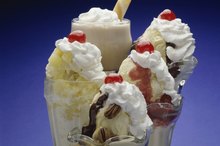List of Caffeine-Free Foods
If you aren’t a morning person or need a jump start to the day, you may turn to a caffeine source to help wake up. Caffeine is a plant product that acts on your central nervous system as a stimulant. Your body can respond to caffeine in numerous ways, from an increased heart rate, body temperature and urine production to dizziness and appetite changes. Depending on the amount you consume, you might feel effects up to six hours after caffeine ingestion, notes the University of Michigan Health Services 1. With certain medical conditions such as high blood pressure, chronic kidney disease and heart disease, your doctor may recommend a caffeine-free diet.
Plenty to Eat
Caffeine is found in the leaves and seeds of plants or is added to foods 2. When you are looking for caffeine-free choices, you can enjoy lean meats, beans, whole-grain breads and rice, cereal, low-fat milk and yogurt, along with plenty of fruit and vegetables as part of a healthy diet. Added fats eaten in moderation, such as butter, margarine or creamer, also contain no caffeine.
Candy and Flavoring for Thought
The Caffeine in Ice Cream
Learn More
Sources of caffeine that you may not consider can be found in candy and flavored foods. Select caffeine-free varieties of these foods on a restricted diet -- for example, choose chocolate-free trail or snack mixes and ice cream and yogurt-covered raisins. Instead of coffee flavored foods, which may contain a limited amount of caffeine, opt for a vanilla- or fruit-flavored yogurt or milkshake.
- Sources of caffeine that you may not consider can be found in candy and flavored foods.
- Select caffeine-free varieties of these foods on a restricted diet -- for example, choose chocolate-free trail or snack mixes and ice cream and yogurt-covered raisins.
Snack Selection
While you should consume all snack foods in moderation, most chips, pretzels, popcorn, gummy snacks and regular jelly beans do not have caffeine in their ingredients. Certain jelly beans and gum may have added caffeine, so read the food labels to identify these items.
Beverage Choice
Caffeine in Slim-Fast
Learn More
Monitoring the beverages you drink is important on a caffeine-free diet. Dietary sources of caffeine come from regular or even decaffeinated coffee, green and black tea, energy drinks, soft drinks and beverage additives. Brewed herbal teas -- either hot or cold -- are good beverage choices, as are water and seltzer. Check the label on energy drinks, soft drinks and flavored beverages. Unless they specifically state they're caffeine-free, many have added or natural sources of caffeine.
- Monitoring the beverages you drink is important on a caffeine-free diet.
- Unless they specifically state they're caffeine-free, many have added or natural sources of caffeine.
Related Articles
References
- University of Michigan Health Services: Caffeine
- Center for Science in the Public Interest: Caffeine Content of Food & Drugs
- Meredith SE, Juliano LM, Hughes JR, Griffiths RR. Caffeine Use Disorder: A Comprehensive Review and Research Agenda. J Caffeine Res. 2013;3(3):114-130. doi:10.1089/jcr.2013.0016
- Richards G, Smith AP. A Review of Energy Drinks and Mental Health, with a Focus on Stress, Anxiety, and Depression. J Caffeine Res. 2016;6(2):49-63. doi:10.1089/jcr.2015.0033
- Brunyé TT, Mahoney CR, Rapp DN, Ditman T, Taylor HA. Caffeine enhances real-world language processing: evidence from a proofreading task. J Exp Psychol Appl. 2012;18(1):95-108. doi:10.1037/a0025851
- Koppelstaetter F, Poeppel TD, Siedentopf CM, et al. Caffeine and cognition in functional magnetic resonance imaging. J Alzheimers Dis. 2010;20 Suppl 1:S71-84. doi:10.3233/JAD-2010-1417
- Harrell PT, Juliano LM. Caffeine expectancies influence the subjective and behavioral effects of caffeine. Psychopharmacology (Berl). 2009;207(2):335-42. doi:10.1007/s00213-009-1658-5
- Lucas M, O'reilly EJ, Pan A, et al. Coffee, caffeine, and risk of completed suicide: results from three prospective cohorts of American adults. World J Biol Psychiatry. 2014;15(5):377-86. doi:10.3109/15622975.2013.795243
- Abdel-Hady H, Nasef N, Shabaan AE, Nour I. Caffeine therapy in preterm infants. World J Clin Pediatr. 2015;4(4):81-93. doi:10.5409/wjcp.v4.i4.81
- American Psychiatric Association. Diagnostic and Statistical Manual of Mental Disorders. 5th edition. Washington DC; 2013.
- Turnbull D, Rodricks JV, Mariano GF, Chowdhury F. Caffeine and cardiovascular health. Regul Toxicol Pharmacol. 2017;89:165-185. doi:10.1016/j.yrtph.2017.07.025
- Centers for Disease Control and Prevention. Alcohol and Caffeine. Updated October 23, 2018.
- Alsunni AA. Energy Drink Consumption: Beneficial and Adverse Health Effects. Int J Health Sci (Qassim). 2015;9(4):468-474.
- Lyngsø J, Ramlau-Hansen CH, Bay B, Ingerslev HJ, Hulman A, Kesmodel US. Association between coffee or caffeine consumption and fecundity and fertility: a systematic review and dose-response meta-analysis. Clin Epidemiol. 2017;9:699-719. doi:10.2147/CLEP.S146496
- U.S. Food and Drug Administration. Pure and Highly Concentrated Caffeine. Updated September 21, 2018.
- National Institute on Drug Abuse. Drugs, Brains, and Behavior: The Science of Addiction. Updated July 2018.
Writer Bio
Stacey Phillips is a registered dietitian and nutrition writer. She has had articles and patient information handouts published in the "Renal Nutrition Forum" and the "Journal of Renal Nutrition." She holds a Bachelor's degree from the University of Illinois in Champaign-Urbana and a Masters degree at Central Michigan University.









